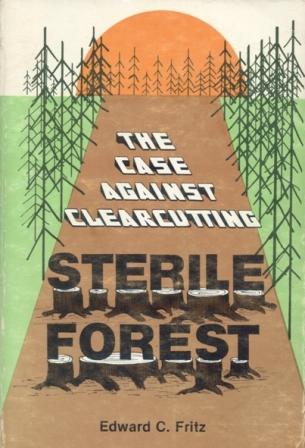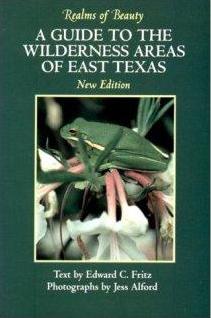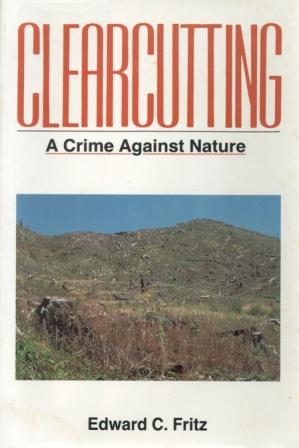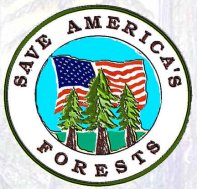A Preview of Ned Fritz's Books
Sterile Forest: The Case Against Clearcutting
(1983)

|
Synopsis: While this narrative relates actions which occurred mainly in East Texas in 1976, the implications are nationwide and ongoing.
The shift to sterile forests is taking place, with slight variations in all national forests and most private forests in the United States.
The current major onslaught in our forests is worse than when the timber barons logged most of America, because they at least left the lands to reforest themselves in their original diversity. The modern clearcutters, by burning, poisoning, and other methods, are preventing the original forest composition from returning. They just want commercial species, like Lob-lolly pine.
In the war between exploiters and defenders of our natural resources, most of the disasters occur gradually, over a period of years. Most are like the decades-long battle to save the bald eagle rather than the three-month campaign to defeat the constitutional amendment on the Clements-Clayton Texas Water Plan.
The effort to save our national forests from wholesale clearcutting is one of the oldest, longest struggles of all. It is about to escalate. National and local citizens groups are laying the groundwork for a nation-wide crusade to reform the National Forest Management Act (NFMA) in several ways, including a strengthening of control over clearcutting.
The first big battle to stop indiscriminate clearcutting took place late in the 19th century, resulting in outlawing the practice in the national forests. In 1964, the Forest Service resumed the practice, leading to the events narrated in this book.
Indiscriminate clearcutting is the practice, in more than 25 percent of a forest, of felling or deadening virtually all the trees in each stand of available commercial timber at the end of each rotation and regenerating a majority of the clearcut stands in chosen species. This includes clearcuts in two stages (“shelterwood” or “seed tree”).
Indiscriminate clearcutting is as different from an individual clearcut as alcoholism is from a single drink.
This true story tells what hunters and foresters have to say about the evils of indiscriminate clearcutting, and how the timber companies and Forest Services respond.
|
Realms of Beauty: The Wilderness Areas of East Texas (1986)

|
Synopsis: Realms of Beauty explores five wilderness areas in East Texas where, in places, we are privileged to see scenes that have nearly vanished from this earth: creek banks where the yellow lady’s slipper orchid still blooms, or shaded vales where the rare Swainson’s warbler has nested every year for more than a thousand years. Comprising 34,000 acres of East Texas forestland north and west of the Big Thicket, these five wildernesses not only hold the key to the region’s past but also reveal how much the flora and fauna have changed. This book introduces the distinctive plant communities and other key features of these wildernesses, designated as such by Congress in 1984. Then, scene by scene, it brings to life each area in informative and interesting text and beautiful color photographs.
Big Slough. Turkey Hill. Indian Mounds. Upland Island. Little Lake Creek. Realms of Beauty surveys all five, providing all the information a reader needs to visit, understand, and enjoy these unique wildernesses. Author Ned Fritz guides you to their perimeters by road, suggests walking routes to choice spots inside, and even recommends places to camp. Presenting a self-guided two-hundred-mile tour among the last protected stands of vanishing plants associations (such as the water oak and pawpaw or over-cup oak and planer tree), he introduces us to living museums of natural diversity. High-lighting the beauties of these selected arbors, Fritz offers memorable illustrations of how, in this natural diversity, the trees, shrubs, flowers, and animals interact for the common good.
Written simply, directly, and accurately, Realms of Beauty also features 55 richly colorful photographs of these special places. Artistically framed by nature photographer Jess Alford, these lovely photographs bring before us the wild beauty of East Texas: its dense groves, delicate flowers, and striking terrain.
|
Clearcutting: A Crime Against Nature
(1989)
 |
Synopsis: This book is to public forests what Common Sense was to the American Revolution – a clarion call for citizens to arise against the abuse of our nation. In this case, the abuse is clearcutting, which is deliberately devastating our native diversity in 100 million acres of public land, about one-sixth of our total timberland. Clearcutting is depleting our soil, silting our streams, decimating our native wildlife, denigrating our open-space recreation, and perhaps most fatally, depriving us for decades of our carbon-absorbing leafy biomass in each clearcut stand, thereby reducing our protection against global warming.
Clearcutting: A Crime Against Nature, has a great advantage over Common Sense. It has graphics, especially sixteen pages of color photographs by professionals and others, carrying the reader over and into public clearcuts from Florida to Alaska, and into well-managed private selection forests, the environmental alternative to clearcutting.
The author inspected clearcuts in seventy-eight of our 120 national forests over a period of ten years. He examined the alternative system, selection management, in private forests from coast to coast, in all seasons and climes.
He talked and corresponded with hundreds of scientists, foresters, private and governmental, and read most of the literature. He debated on television, in the press, and in college sessions. But he learned the most by preparing for and participating in the big Red-cockaded woodpecker trial of 1988, still on appeal. You have to know a subject well to win a lawsuit about it.
Although rich in facts, this book addresses the average American reader. It lays out the questions and answers about clearcutting in plain, hard-hitting, often colorful prose. It makes no pretext of academia and as a result, is more captivating and useful. After arousing the concern of the reader, this book tells what citizens must do to restrain clearcutting before it consumes our federal forests.
|
Save America's Forests Home Page
|
|
.. |
|
|
"If unified with all the people who abhor clearcutting, these groups have the energy and resources to move Congress into action.
They could all join forces on a comprehensive bill or packet of bills that would accomplish full forest reform."
 |
The Red cockaded woodpecker, one of many Texas species Ned championed |
From Sterile Forest by Ned Fritz

|
"When I watch the devastation of clearcutting, I understand what is involved. The forest service would have us believe that there is no sunstantial soil and nutrient loss associated with clearcutting. Following a massive clearcutting on the Gauley Range ranger district on our Monongahela National Forest, the cranberry river--a beautiful river, a river of brook trout, a magnificent stream--for a seven week period ran muddy as if it were a lowland stream and not in the hills of West Viginia. I see that and I know that there is a substanial loss of soil and a substantial loss of nutrients within the land.
"So my concern is that I do not believe we know what the long-range effects of clearcuts will be on the ability of land to regenerate."
From Realms of Beauty: The Wilderness Areas of East Texas by Ned Fritz

"Old growth and intermediate communities have other values, as well. They serve as living museums to educate present and future generations on the natural heritage of their region. They provide authentic laboratories where scientists may engage in research on such vital subjects as survival and evolution. And they constitute gene pools for substances products useful to humankind."
|
|
|







